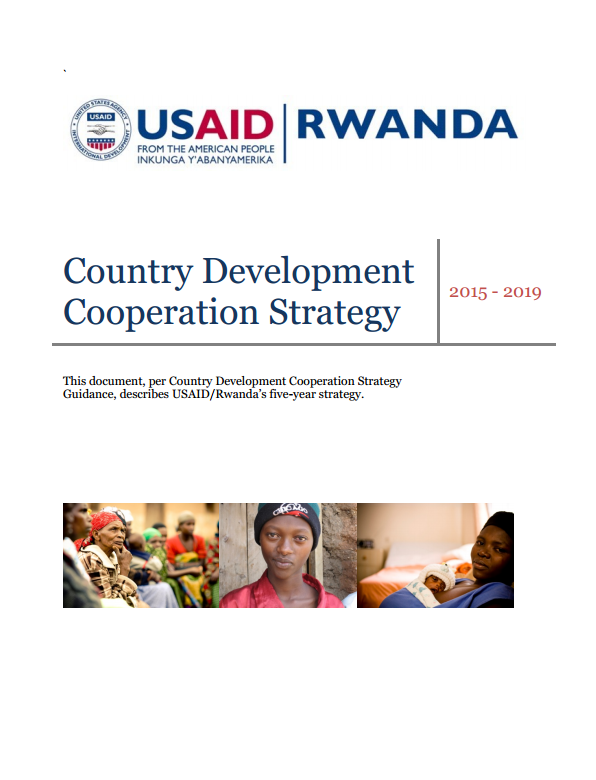Rwanda’s extraordinary recovery from complete political, economic and social collapse after the 1994 genocide represents one of Africa’s most dramatic and encouraging success stories.
The Government of Rwanda (GOR) has made a decisive commitment to confront its daunting development challenges head-on, and to undertake a fundamental, broad-based economic and social transformation intended to produce sustainable and equitable national development. This commitment has already yielded highly-visible results in terms of prolonged peace and political stability, as well as major economic and social progress. Annual economic growth rates are among Africa’s highest, and huge strides have been made in social indicators such as child and infant mortality, household income, and primary-school enrollment levels. Nevertheless, Rwanda remains among the world’s poorest and most densely populated countries, and a strong partnership between the GOR and international donors must continue if Rwanda is to reach middle-income status.
Opportunities
Rwanda represents an extraordinary opportunity for the United States Government (USG) to put its foreign policy priorities into practice by supporting a clear, reasoned and wholly country-owned development vision, in cooperation with a committed and disciplined partner-country government. It also represents a unique opportunity for USAID to operationalize its new strategies for delivering development assistance more efficiently, effectively and sustainably, through the application of aid effectiveness principles under the aegis of the USAID Forward initiative.
Rwanda’s agricultural sector presents opportunities for innovative, targeted investments in areas such as value-chain development and strengthening (maize, beans and dairy), and in GOR policy reform to encourage agriculture-sector investment, including privatization of input markets, improved rural transportation infrastructure, and more efficient and cost-effective post-harvest handling and storage of crops. The household-income multiplier potential of these sub-sectors provides an opportunity to ease the transition from small-scale and subsistence agriculture to a more commercialized agriculture sector that provides a significantly diversified range of employment and business opportunities for small farmers.
The GOR’s recognition of the necessity to increase public access to education and, enrollment, and school attendance provides an opportunity to support the essential other half of the equation—education quality. Appropriately targeted interventions in providing foundational literacy and numeracy skills for children in early primary school can provide a long-term foundation for building a workforce capable of supporting the national development vision of a modern service-based economy. In addition, relevant investments in youth and workforce development will allow Rwanda to better capitalize on the “youth dividend” and promote transformation of the youth bulge in an educated and highly skilled labor force.
Rwanda is internationally recognized for its high level commitment to promoting gender equality and women's empowerment. Findings from the USAID/Rwanda Gender Assessment completed in 2011, show that women were key drivers of Rwanda’s economic recovery and development after the 1994 genocide. In the immediate post-conflict period, the GOR undertook radical and far-reaching reforms to address the political, social, legal, and economic status of women. Additionally, the Constitution of Rwanda, adopted in 2003, pro-actively promotes gender equality. It outlaws any form of gender discrimination, and incorporates the principle of equality within marriage, and requires women to hold at least 30 percent of decision-making positions in the GOR. The National Gender Policy of 2010 contributes to reducing gender inequalities in all sectors, as a key component of sustainable development, with more emphasis on inclusion of groups that are traditionally marginalized, such as women and children (orphans and vulnerable children).
Rwanda has made remarkable strides in reforms that have placed gender at the forefront of Rwanda’s leadership, and have empowered women to influence policy-making, planning, and resource allocation processes. Sixty-four percent of Rwanda's parliament are female, and several cabinet-level positions are held by women. The Ministry of Gender and Family Promotion, the Ministry of Finance and Economic Planning, and the Gender Monitoring Office work together to provide guidance for developing gender-sensitive strategies and programs. Recent engagement by the private sector in gender equality and women’s empowerment has increased and creates an opportunity for USAID to implement the Agency’s Gender Policy and to support the GOR’s efforts in addressing gender inequalities. USAID/Rwanda’s programs will help support more changes on the ground through gender integration across all sectors.
Pursuing public-private partnerships in Rwanda will allow USAID to leverage the amount of funding available for targeted and collaborative interventions, which have potential to increase the likelihood of the private sector’s engagement and to sustain achieved results. USAID/Rwanda will develop and put into practice a standard screening tool for technical offices to use during the project development stage to determine if a planned intervention is a likely candidate to be pursued through a public-private partnership. Attention will be given to ensure that public-private partnerships actually increase the provision of a public good, which would not be possible without USAID support.
Finally, Rwanda offers an opportunity to work cooperatively with the GOR and civil society to promote the rule of law, protect civil rights and liberties, and increase the accountability and effectiveness of governance and public-policy formulation and application. These serve to increase private citizens’ voice in national decision-making, while building trust and mutual respect between GOR institutions and Rwanda’s civil society. This is vital to Rwanda’s ability to maintain its current consensus on national development policy while sustaining the dramatic recovery it has achieved since 1994.
Read the full report [pdf]









Comment
Make a general inquiry or suggest an improvement.